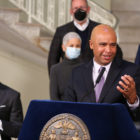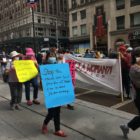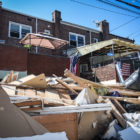CityPlate: Food Policy in NYC
NYC Street Vendor Enforcement Back at Pre-Pandemic Levels, Despite Shift Away From NYPD
Daniel Parra |
From June to December 2021, the Department of Consumer and Worker Protection (DCWP), which took over street vendor inspection and enforcement duties in 2021, issued 762 fines, and another 171 fines so far this year. The top five zip codes that saw the most enforcement were those with large immigrant populations.














